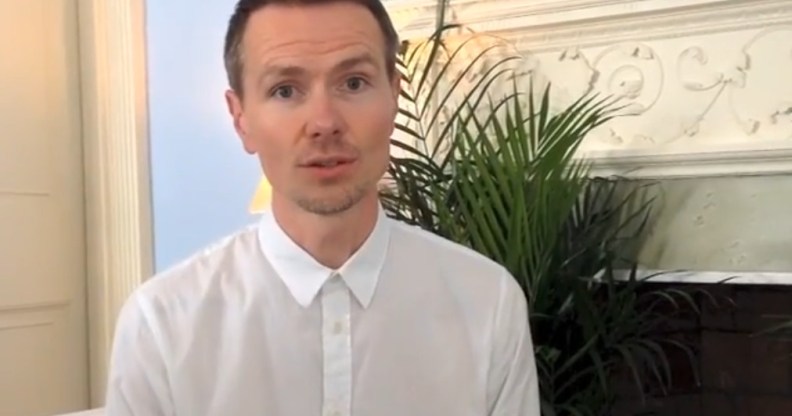Six teens broke a gay author’s nose and cheekbones in brutal ‘homophobic attack’

Gavin McCrea (YouTube)
Gavin McCrea (YouTube)
A gay author has been left with a broken nose and cheekbone after six teenage boys brutally assaulted him in a ‘homophobic’ attack.
Irish author Gavin McCrea was walking in Dartry Park in Rathmines, Dublin, at around 6pm on February 1 when he was set upon by the group of boys, the Irish Times reports.
McCrea had just left the library at University College Dublin (UCD) where he had sent the manuscript of his new novel to his publisher – a novel that took five years to write.
The author was talking to his uncle on the phone about his planned trip to Berlin, where he was planning to celebrate the completion of his novel, when he was approached by the group of boys. They started using “homophobic” insults and threw stones at him.
The boys ran away when the gay writer flagged down cars in an effort to get rid of them. But that was not the end of his ordeal. Fifteen minutes later, while still walking, the same group of boys attacked him from behind. He was punched and kicked and had his cheekbone and nose broken during the attack.
Gardaí are treating the incident as a possible hate crime, however no arrests have been made. They are urging anybody with information to come forward.
Gay author Gavin McCrea left Ireland after enduring homophobic bullying in his childhood.
Gavin McCrea, who has lived abroad for most of his adult life, spoke to Spanish publication El País about the attack.
In the interview, the author said going public about the attack made him uncomfortable, but he felt it was “the right thing to d..”
“I was bullied severely from the ages of ten to 20, after which I left Ireland vowing never to return, and now I have and I am made revisit those old experiences. It has been quite intense,” he said.
He also said the attack gave him a feeling of “deja vu” as his attackers were the same age as his childhood bullies.
McCrea has been “overwhelmed” by the love and support he has received since the attack, but was disheartened when he received a €100 bill from the hospital he went to with his injuries. He said the bill made him “furious”, and it felt like “the final kick”.
McCrea’s attack is not an isolated incident in Ireland, where a number of high-profile anti-LGBT+ attacks have made headlines in recent months.
On January 31, a gay couple was violently attacked at Newbridge train station in Co Kildare. One half of the couple was kicked in the face while the other was stabbed.
I was bullied severely from the ages of ten to 20, after which I left Ireland vowing never to return, and now I have and I am made revisit those old experiences.
Gearóid Laighléis wrote in a Facebook post that his partner Anthony was stabbed four times while one of the attackers filmed the incident.
“Never in my life did I think I would be kneeling next to somebody I’m with, holding their stab wounds to stop the bleeding to keep him alive,” he wrote.
“I’d never wish what I witnessed tonight on my worst enemy.”
In October of last year, Marc Power arranged to meet a man on Grindr at an Odeon cinema, but was instead greeted by a group of teenage boys who beat him with hammers.
“They tried to kill me with these weapons,” Power wrote in a Facebook post shortly after the attack.
“They were trying to hit me on the head with hammers. They didn’t manage but I’m in the emergency room in hospital with facial injuries and my car was destroyed.”
In September, a Brazilian man living in Dublin Danilo Matta was attacked with steel bars after kissing his boyfriend goodbye outside his own apartment.
Ireland’s outdated hate crime legislation makes convictions difficult.
Following the spate of high-profile homophobic attacks, Ireland’s department of justice said in October that it was conducting research into international best practice on hate crime legislation. The department also said they would begin a public consultation process.
The country has outdated hate crime legislation which means that convicting people for hate crimes is extremely difficult. The current legislation also means that the country has limited statistics on anti-LGBT+ hate crime.
The legislation that is currently in place – the Incitement to Hatred Act 1989 – is not fit for purpose, activists claim. The Irish Times reported in 2017 that the Act had led to just five convictions since its introduction.
The Act predates the decriminalisation of homosexuality in Ireland and makes it an offence to create or distribute racist, homophobic or discriminatory materials. Those convicted face up to two years in prison and a €10,000 fine.

